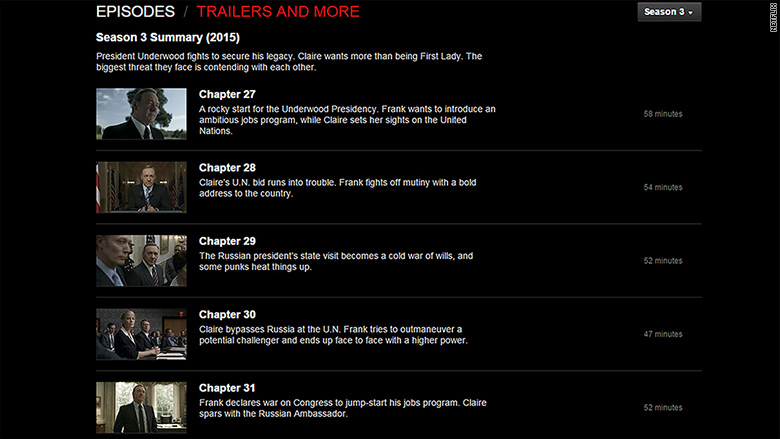

What I still can’t promise is that you’ll care. House of Cards probably feels like it’s on a higher artistic plane than Scandal, when the reality is that it could almost always use a little more of Scandal‘s Motown-enhanced tawdriness in place of its own bloodless self-denying soapiness. Her entire storyline is reflective of the series’ brazen ego, that nobody cares in the slightest that they’re doing an arc that’s virtually identical to what Mellie Grant has been doing on Scandal for the past two years. Claire is especially active this season as she fulfills the Clintonian journey she’s been on. Significantly more happens this season, much of it absurd and contrived, but at least it’s better than a total absence of on-screen incident.

This, then, actually represents another point of improvement, because writing about last season, I couldn’t have spoiled anything if I’d tried. There are also several returning figures from earlier in the series, but an embargo tells me I can’t mention them, even the character who appears in the opening shot of the season. Joel Kinnaman, playing an eventual presidential rival for Underwood, is spotted in the first episode and heard on the radio later, but doesn’t really become important factor from what I’ve seen.
HOUSE OF CARDS SEASON 4 LEAK FREE
Neve Campbell joins as one of those mono-expressive characters, a political operative who everybody describes as being brilliant, but does nothing brilliant through six episodes and despite her alleged brilliance is in the middle of an election year with enough free time to serve as a glorified postman for the Underwoods. You can also expect Cicely Tyson to be in the Emmy conversation as a Texas politician who enters the Underwood sphere. Ellen Burstyn pops up as Claire’s patrician, withholding mother, essentially guaranteeing herself an Emmy nomination, but also adding that bristling chill that Burstyn delivers so well. That - the stunt-casting, not the show’s dynamic range - changes in the fourth season, and House of Cards is the better for it. She threatened to leave him, and season four picks up soon enough afterwards that Frank and Doug and the White House gang are trying to figure out how either to lure Claire back or spin why Claire has gone off to Texas, rather than New Hampshire, for the next primary challenge against perpetually grumpy Heather Dunbar (Elizabeth Marvel).ĭespite all of the show’s initial acclaim and its ongoing awards-show success, House of Cards has never been big on stunt casting, perhaps because departing showrunner Beau Willimon and the other scribes write characters who are so darned dogged and determined that they can go 30+ episodes and never have cause to change their expressions.

It was an entire season about Doug’s (Michael Kelly) rehab, a generic global political crisis, the introduction of a suitably dour political rival for Frank and making Frank so awful that the only suspense as the finale approached was whether Claire (Robin Wright) would kill him or leave him. The problem is compounded when Frank’s amoral behavior isn’t creative, ambitious or fun, as was the case through almost the entire third season. Just don’t expect me to invest in either success or failure. Run roughshod over one-dimensional rivals with no interior lives. And if Frank doesn’t care about us, I find that I don’t care about him. The only memorable to-the-camera conversation in the first six episodes of the fourth season comes while he’s making a sandwich, and it feels like it’s only there because Frank has nothing better to do. If you rooted for him, it was because he brought us in on his scheming and pragmatism and because House of Cards has only ever given Frank straw men as political foes.įrank no longer cares about us in the same way. Unlike a Walter White or a Tony Soprano, Frank Underwood was never made likable or sympathetic in conventional ways as an unnerving counterpoint to his icky behavior. The conversations with the audience were about dramatic affect, but they were also about complicity. At some point, Frank Underwood went from “entertainingly venal” to “ ham-fistedly dreadful.” Depending on your perspective, that moment may have involved infidelity, either of the people he killed, pissing on a grave or whatever causes the needle in your moral compass to spin the wrong way.


 0 kommentar(er)
0 kommentar(er)
